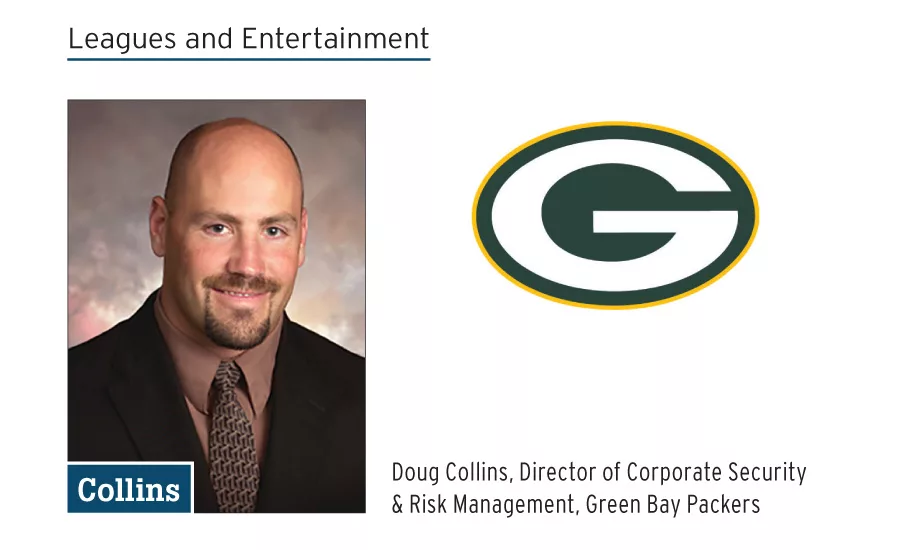Doug Collins: Modeling Stadium Security

Even though he grew up in Green Bay, Wisconsin, working for the Green Bay Packers certainly wasn’t anything Doug Collins thought about doing as a child. “When you’re a kid, all you think about is the athletes on the field and having fun, but there are a lot of people behind the scenes that are doing a lot of work in order to make that happen,” says Collins. Today, he’s in his 14th season as the team’s Director of Corporate Security and Risk Management.
Making sure that people who visit Lambeau Field have a great experience, while upholding the Packers’ mission of winning championships and delivering “excellent guest experiences while being guided by our core values” of teamwork, respect, stewardship, integrity, and excellence, is the heart of Collins’ job, and also the most difficult part. “Providing that safe and enjoyable environment for everyone, but also being invisible is tough,” Collins says. “You try to do everything in your power to make it efficient, yet seamless, and as invisible as possible.”
One of Collins’ favorite aspects of working in the leagues and entertainment sector is the relationships he builds. “Every team has a security director; every major city has one,” says Collins. “You really get a connection in that network of folks, and you can bounce things across their desks that, coming from a different area of the country, they may see differently. It allows you to develop a fully encompassing program.”
Putting 80,000 people, some of whom have had a considerable amount of alcohol, together in a small space definitely makes for a challenging work environment. “Not only getting everyone through checkpoints to make sure we are in a secure environment, but also handling the issues that come up within that small city you have on your hands,” Collins says. “As the world changes, those that want to harm us develop certain techniques, and you have to try to counteract those. Security is a moving target, and you have to move with it.”
As a security leader, Collins is most focused on “game day safety and security, but there is no one thing within that day that is bigger than the other,” he says. “They are all very important.” During the off-season, Collins and his team take time to evaluate their policies and procedures. “We do some table top exercises with the public safety partners that we are with to ensure that what we’re focusing on is practiced upon, and we try to eliminate any holes, whether it’s communication gaps or physical security items,” says Collins.
Because the Green Bay Packers have shareholders instead of an owner, the executive committee “understands the importance of security, and they are always knocking on my door and asking me if there is anything I need,” Collins says. “Since we don’t have an owner, all the money we make gets put back into the organization and the facility in one form or fashion. It’s set up to make improvements when we need them.”
Since the Packers don’t have a cash flow problem like other teams or stadiums might, their stadium is often seen as a standard in their sector. “I think a lot of teams look to us for ways to do things,” says Collins. “We have had major universities that have come here and toured and looked at our facility as they go to develop either a new stadium plan or a renovation.”
Judging by the surveys conducted by the league, Collins’ security team, as well as third parties, Collins and his team are keeping stadium visitors happy. “We rank very high in how people feel about our security program. They feel safe. They know how to report things. Our communication with them always ranks very high. They realize that we are doing everything we can to keep them safe,” he says.
This year, the Packers were awarded the Safety Act designation and certification by the Department of Homeland Security, which is the highest level of protection. “It was a huge process to go through, but it basically verifies that the process and policies that we have in place are working and are the right ones,” says Collins. Lambeau Field is the eighth sports venue to obtain a level of Safety Act protection.
In his spare time, Collins enjoys spending time with his wife and three daughters “away from this facility in a family setting. That, youth sports, and the outdoors take care of all the spare time I have,” he says.
Security Scorecard
Annual Revenue: $375 million
Security Budget: $1.9 million
Critical Issues
-
Employee Staffing and Retention
-
Regulations and Procedures
-
Unknown Threats
Looking for a reprint of this article?
From high-res PDFs to custom plaques, order your copy today!






